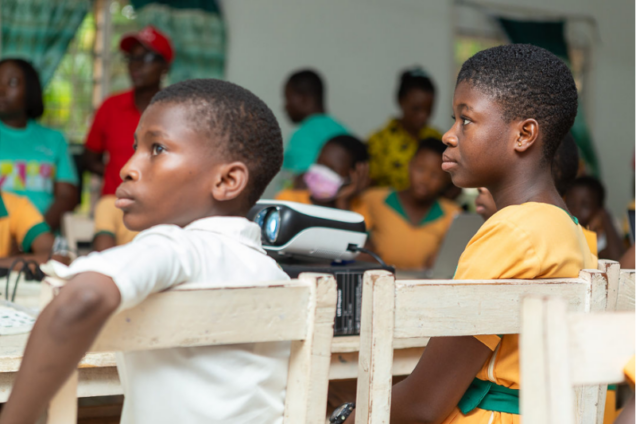Telecel Ghana Foundation has launched the Telecel Digitech Academy at St. Cecilia RC School, Hodome in the Volta Region, to equip young students across Ghana with the essential digital skills required for the future.
The Telecel Digitech Academy is a hands-on practical approach to Science, Technology, Engineering, and Mathematics (STEM) education to prepare the next generation of Ghanaians for the evolving global economy.
Speaking at the launch event, Augusta Andrews, Director of Legal and External Affairs at Telecel Ghana, emphasized the academy’s mission of empowering students, particularly young girls.
“The Telecel Digitech Academy is not just about providing technological tools, but empowering our youth to be creators, problem-solvers, and leaders.
"Our goal is to allow as many students as possible to succeed in the digital economy,” she stated.
The academy places a strong focus on inclusivity, ensuring that 70% of participants are girls, and addressing the gender gap in STEM education across the country.
The Telecel Digitech Academy, under the Foundation’s connected learning pillar, will focus on providing practical knowledge in robotics, programming, and website development, ensuring students are not only consumers of technology but creators and innovators.
The initiative is also part of the Foundation’s broader commitment to bridging the digital divide and fostering future-ready skills for students in both urban and rural areas.

In support of the initiative, the Director of the National STEM Centre Mrs. Olivia Serwaa Opare, stressed the importance of partnership and collaboration to achieve Ghana’s digital agenda.
In a speech read on her behalf, she said, “Programs like the Telecel Digitech Academy are shaping Ghana’s future.
"To truly empower our youth and prepare them for a competitive global market, we must ensure that they do not just use technology but understand and master it,” she added that digital literacy and STEM education are no longer optional but essential for the country’s growth.
David Asumadu, CEO of Asustem Robotics, one of the implementing partners in the program, highlighted the academy’s emphasis on practical application.
“We are not just teaching students how to code or build robots. We are preparing them for the future of work, where technology will be at the core of everything,” he explained.
The academy’s curriculum covers website development, scratch programming, the Internet of Things (IoT), and robotics, providing students with the tools to innovate in various fields.
He further encouraged students to embrace the skills they acquire, noting, “After this training, you’ll be able to develop websites, work on AI projects, and apply your knowledge in real-world challenges.”
The Telecel Digitech Academy will run along the GES school term and is designed to supplement traditional classroom education with project-based learning.
Latest Stories
-
Police exhume multiple human remains in Central Tongu shrine
1 hour -
Ramaphosa opposes Trump’s 30% tariff on South Africa
2 hours -
First malaria treatment for babies approved for use
2 hours -
Alcaraz masterclass ends Norrie’s Wimbledon hopes
2 hours -
TOR throws light on premix composition amid sector reforms at stakeholder engagement
2 hours -
TOR dismisses claims of unchecked fuel dispatches, highlights strict multi-agency verification process
3 hours -
MPs vote to establish independent regulator for men’s football in England
3 hours -
Ghana abstains from UN vote on LGBTQ+ rights amid push for criminalisation
3 hours -
Jota’s car was probably speeding before fatal crash, Spanish police say
3 hours -
CJ’s powers too excessive, prone to political abuse – Prof. Prempeh calls for urgent reforms
3 hours -
Mahama inaugurates committee to oversee handover of UGMC to UG
3 hours -
Joao Pedro double sends Chelsea into Club World Cup finals
3 hours -
Former Arsenal sporting director Edu joins Nottingham Forest
3 hours -
KNUST Animal Science Dept trains experts to enhance poultry productionin Ghana
4 hours -
Newmont Ahafo South mine allocates $34m for road construction between 2025 and 2028
5 hours

